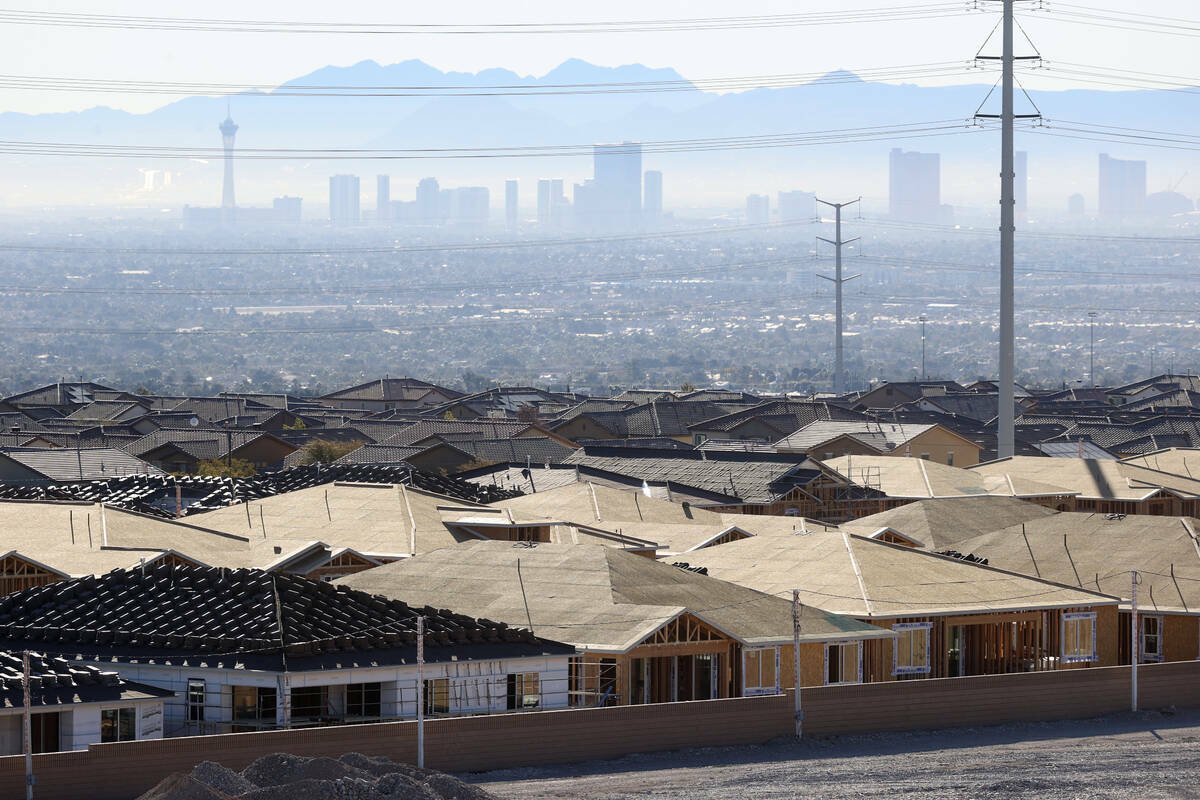Gov. Joe Lombardo this week pushed legislators to issue a resolution urging the federal government to release land for housing development in Nevada, though the leaders of the Democratic-majority Legislature have plans of their own to address housing.
Las Vegas Valley residents face an affordable housing crisis caused by elevated interest rates, a slowdown in building, a lack of buildable land and increased construction and labor costs. Nevada is short more than 78,000 affordable rental units, and the urban area is landlocked with 88 percent of Clark County alone controlled by the federal government.
The Republican governor proposed a draft resolution for the Legislature that calls on Congress and President Donald Trump to facilitate the release of federal lands, adopt a timeline for land transfers and prioritize bipartisan legislation to “address the inequities created by federal land retention.”
His draft resolution also claims the retention of federal land infringes upon Nevada’s sovereignty and accuses the federal government of mismanaging Nevada’s lands, which has increased ecological risks such as wildfire threats.
“I have continued to engage with our federal delegation and the President on this issue, and I am seeking your support to advocate for the immediate and systematic release of federal land in Nevada,” he wrote to Senate Majority Leader Nicole Cannizzaro and Speaker Steve Yeager.
Democrats’ own resolution, plus policy proposals
Assembly Majority Leader Sandra Jauregui, D-Las Vegas, also has a resolution that urges the federal government to open more lands as well as protect lands, she said.
The Legislative Counsel Bureau has been working to draft that resolution since late last year, she said.
Jauregui said her resolution is balanced and better than Lombardo’s because it references the Southern Nevada Economic Development and Conservation Act, which calls both for more federal land for development and for protecting land, and because she worked on the bill with community stakeholders, including housing builders and conservation partners.
Lombardo’s resolution did note proposed legislation like the Southern Nevada Economic Development and Conservation Act aims to address concerns but said it “has yet to be enacted into law, leaving significant gaps in meeting the State’s land development requirements.”
Opening up federal land is a long-term solution, Jauregui said, “but it’s not something that addresses the needs of Nevadans right now.”
“This is just one of the solutions, but it’s the long-term solution,” she said. “It’s about planning for the future. At some point, the governor is going to have to be willing to pass some housing policy that’s going to bring relief today.”
The Democratic majority leader cited policy proposals from the last session the governor vetoed that are being reintroduced this session, including Assembly Bill 298, which would have authorized rent control for seniors and those with disabilities; AB340 on summary evictions, and Senate Bill 395, which puts limits on land purchases by out-of-state corporations.
“If we’re calling on the federal government to give us more land, we have to make sure that we are protecting that land and that development for Nevadans,” she said.
Varied housing solutions
David Edelblute, a commercial property and development attorney with Howard &Howard whose advocacy work focuses on federal land development, said Lombardo’s push to open federal land is a “giant piece of a complex puzzle” to improve housing affordability.
“Opening federal land is a critical first step to solving Nevada’s housing issues and economic development issues, but I think it requires a multifaceted approach,” Edelblute said. “And going about it this way — seeking some support from the Legislature — is helpful at the federal level, because then we can go as a unified group off to Washington, D.C., and say, ‘We’re all in agreement that we want to go about it this way. Please address the issue.’”
The first huddle is convincing the federal government to release land. Next, zoning and regulatory reforms need to occur at the local level, Edelblute said. The state also needs to engage in public-private partnerships and find ways to balance consumer protection with robust development, he said.
If more land doesn’t get released, both Northern Nevada and Southern Nevada face a land shortage in the next several years, Edelblute said.
Battle Born Progress, a progressive organization, argues such a move would worsen sprawl in Nevada’s cities and lead to increased traffic and stressors on the state’s infrastructure.
Mathilda Miller, government relations director of Indigenous Voices of Nevada, said the proposals to transfer federal lands for development overlook “the profound and enduring connection Indigenous communities have to these territories.”
“Treating these sacred areas as mere commodities for development disregards our ancestral responsibilities and threatens sites of deep cultural significance,” Miller said in a statement.
Solutions should put a priority on sustainable development that respects the environment and the rights of Indigenous communities, Miller said.
The draft resolution states that any systematic release of federal lands must recognize the needs of Nevada’s tribal communities and ensure their rights and cultural heritage are respected.
Congressional action
Opening up federal land requires action from Congress, and Nevada’s federal delegation has been working to address Nevada’s housing crisis, such as introducing bills to prevent price gouging in the housing market.
Nevada’s Democratic Rep. Susie Lee and Sen. Catherine Cortez Masto’s legislation aiming to speed up federal land transactions in Nevada recently became law.
The Accelerating Appraisals and Conservation Efforts Act allows the Department of the Interior to contract with private appraisers who assess the value of public land before a transaction, tackling the bottlenecks in federal appraisals and expediting the process. Lombardo had endorsed the bill.
Contact Jessica Hill at jehill@reviewjournal.com. Follow @jess_hillyeah on X.

